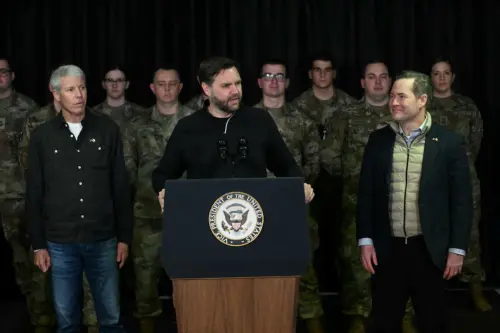U.S. Vice President JD Vance accused Denmark of inadequately ensuring the safety of Greenland and suggested that the United States could offer better protection for the semi-autonomous Danish territory, which President Donald Trump has previously expressed interest in acquiring.
During a visit to the U.S. military base at Pituffik, Vance stated that while there are no immediate plans to expand military presence, the U.S. will invest in increased resources, including additional naval ships. He emphasized respect for Greenland's sovereignty but indicated that the territory would benefit from a partnership with the U.S., a claim the Danish prime minister deemed unfair.
Vance criticized Denmark for not providing sufficient resources to protect the military base and safeguard the people of Greenland from "aggressive incursions" by Russia, China, and other nations, although he did not provide specific details about these incursions.
Trump has often claimed that acquiring Greenland is essential for U.S. security, highlighting its strategic importance since Denmark has governed the island since 1721. Vance's strong criticisms of Denmark, a long-standing U.S. ally and NATO member, reflect the Trump administration's diminishing regard for traditional alliances.
In Greenland, Vance highlighted that Russia, China, and other nations are showing significant interest in Arctic passageways, naval routes, and minerals, pledging increased U.S. investment in military assets like naval ships and icebreakers.
As local unease about his visit grew, Vance assured Greenlanders of their "self-determination" and reaffirmed U.S. respect for their sovereignty. He expressed confidence that Greenland would see the advantages of a partnership with the U.S., claiming such a relationship would enhance security and economic prospects for the territory.
His statements came shortly after the presentation of a new strategy aimed at maintaining ties with Denmark. Greenland's new prime minister, Jens-Frederik Nielsen, criticized the visit as a sign of "lack of respect," while Danish officials reaffirmed their commitment to Greenland.
Danish Prime Minister Mette Frederiksen countered Vance's remarks, recalling the longstanding partnership between Denmark and the U.S. during challenging times. Foreign Minister Lars Lokke Rasmussen acknowledged Vance's point about Denmark's shortcomings but pointed out that the U.S. has also not fulfilled its commitments, noting that U.S. military presence has dramatically decreased since the Cold War.
During Vance's visit, Trump reiterated the necessity of Greenland for global peace and security, asserting that the U.S. cannot afford to overlook its strategic significance in the face of increasing activity from Chinese and Russian ships.
Upon arriving in Greenland, Vance met with U.S. armed forces stationed at the remote base, located 750 miles north of the Arctic Circle. The temperature at Pituffik was a chilly minus 3 degrees Fahrenheit.
Accompanying Vance were his wife, Usha, national security adviser Mike Waltz, and Energy Secretary Chris Wright. According to a 1951 agreement, the U.S. can access its base with prior notification to Greenland and Copenhagen. The base, located along a critical route from Europe to North America, plays a vital role in the U.S. ballistic missile warning system.
Greenland holds significant mineral, oil, and natural gas reserves, yet development has been slow, with limited U.S. investment in the mining sector, primarily dominated by Australian, Canadian, or British companies. A White House official noted that Greenland possesses rare earth minerals crucial for the U.S. economy's future.
The extent of Trump's ambitions regarding Greenland remains uncertain. Experts suggest that while military action is unlikely, pressure may continue through ambiguous statements, unofficial visits, and economic means.
Polls indicate that the vast majority of Greenlanders oppose becoming part of the United States. Protests featuring slogans like "Make America Go Away" and "Yankees Go Home" have marked significant public dissent. Recently, residents in Nuuk demonstrated their sentiment by planting flags and erecting signs declaring "Our Land. Our Future."
Nielsen called for political unity amid ongoing pressures, emphasizing the importance of standing together as a people during challenging times. His pro-business party, the Democrats, which advocates for gradual independence from Denmark, emerged as the largest party in the recent elections.
